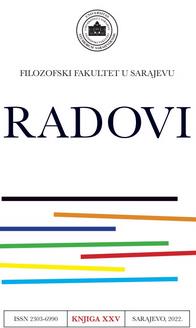REFORMATIVE EXTREMES OF BROWNING’S MASKS
REFORMATIVE EXTREMES OF BROWNING’S MASKS
Author(s): Denis KuzmanovićSubject(s): Theory of Literature, British Literature
Published by: Filozofski fakultet Univerziteta u Sarajevu
Keywords: Browning; poetry; dramatic monologues; Victorian era; repression; desire; reform; society;
Summary/Abstract: Robert Browning, a major Victorian poet, is primarily known for his sophisticated use of dramatic monologues and unreliable speakers. He is also noted for featuringidiosyncratic characters from interesting settings, like the Medieval or Renaissance times. There is a lot of subtext, hidden meanings, ideas, allusions and criticisms to be found between the lines of his poems. Readers are often perplexed by these seemingly too eccentric and exotic characters, and this “remoteness” which Browning cultivates can be interpreted as an indirect societal critique of the Victorian era, primarily of gender roles and marital expectations, class mixing, hypocrisy, self-righteousness, delusion, narcissism, the dichotomy of public and private persona and the conflict of idealistic and realistic representations of life. These themes are explored in his best-known poems such as the twins of Porphyria’s Lover and Johannes Agricola in Meditation, then another poetic pair of Count Gismond: Aix in Provence and My Last Duchess, finally concluding with Fra Lippo Lippi, and each specific issue is dealt in their respective poems. If seen through this perspective, this distancing through colourful and alluring, if also strange, bizarre and off putting characters may entice Browning’s readers to contemplate these themes without being repelled or bored if those were put into their modern setting, which would likely make them tediously didactic and mundane. Thus, these poems can succeed in entertaining but also morally elevating us.
Journal: Radovi Filozofskog fakulteta u Sarajevu
- Issue Year: 25/2022
- Issue No: 1
- Page Range: 89-109
- Page Count: 21
- Language: English

